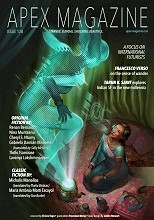 Apex #128, December 2021
Apex #128, December 2021
“Soil of Our Home, Storm of Our Lives” by Renan Bernardo
“Robin’s Last Song” by Nina Munteanu
“Godmother” by Cheryl S. Ntumy
“The Synchonism of Touch” by Gabriela Damián Mirvete
“Dreamports” by Tlotlo Tsamaase
“Samsăra in a Teacup” by Lavanya Lakshminarayan
Reviewed by Kevin P Hallett
Issue #128 of Apex includes six original stories, including two novelettes. It was an entertaining collection of stories well worth the effort to pick up and read.
“Soil of Our Home, Storm of Our Lives” by Renan Bernardo
The setting for this SF short is Brazil, after climate disasters have led to anarchy and now some recovery. Alzira lives a quiet life outside of Rio, tending to her garden and feeding the poor, when two terrorists appear at her door, running from the authorities.
But what are terrorists to one group, are loyalists to another group, and maybe just people trying to survive to a third group. Alzira passes through all three viewpoints as she gets to know them and finally sees just what they have to share with the world.
The story’s backdrop was the Brazilian culture and how it changed after the disasters. The plot crept along, juxtaposing Alzira’s life with her son’s memory of who she was.
“Robin’s Last Song” by Nina Munteanu
Robin helps to develop new acoustic technology in this SF short. She uses sound to identify a stable biosphere so scientists can recognize any disturbances to nature before they see them. But the technology fails to predict the catastrophic death of almost the entire avian family of animals after a rogue company bioengineers fungus to kill insects that blight the crops. In the end, it had the opposite effect, killing the birds that ate them.
Disillusioned, Robin retreats from her research, and when a disease blinds her, she becomes a hermit, pushing away her family and friends. But life is resilient, and after thirty years, biologists hear new sounds in remote parts of the world. Is it too late for Robin to help?
The story showed humanity’s arrogant treatment of its home from a different perspective. The character-centric tale helped to bring a new pathos to the oft-explored subject.
“Godmother” by Cheryl S. Ntumy
Attah is assigned to evaluate the AI called Godmother in this short SF story. Petty Officer Attah is considered the runt of his over-achieving family in Accra. And it was only at his third attempt that he was able to join the much-despised Department of Authentication.
Attah interviews Godmother several times to try and understand why the people love her, even though she isn’t human. Surely she is a charlatan and has broken the law. But in his interviews, Attah finds that what he has held dear has held him back. And he comes to understand human needs and motivation better.
‘Godmother’ explored the question of taking humanity away from what it always needed. The prose was easy to read, though the ending was predictable.
“The Synchonism of Touch” by Gabriela Damián Mirvete
In this fantasy novelette, a strange flower brings together Ekra with his girlfriend and her sister. He discovers the flower while researching hallucinogenic mushrooms found at the top of a mountain in the jungle. The flower’s spores create a link between them that transcends distance and time and lets them understand a future in which his girlfriend will die young.
Ekra’s girlfriend begins a biological assessment of the flower and struggles through all the scientific institutions’ bigotry for anything remotely psychedelic. The world, as expected, is not ready to accept her findings or embrace the benefits the flower brings.
In time, climate change and viral pandemics pull people apart. But the three of them remain connected despite living different lives in different parts of the world. Soon Ekra’s ex-girlfriend’s time on this planet will end. Can the connections help?
This story read well, though the material seemed to be more of an exploration of taking psychedelic drugs; until the twists at the end brought a dusting of speculative fiction.
“Dreamports” by Tlotlo Tsamaase
In this futuristic SF novelette, Kefilwe allows people to use her body via the Dreamport. She effectively rents herself out for others to experience life through her. Of course, there are many safety measures to deal with the multiple adverse consequences, from pregnancy to murder.
When an older couple from the UK hires her precisely because she is black and speaks Zambian, Kefilwe is pleased to earn some money. After all, it’s only for four days. At the appointed time, she retreats to a white space. But after a few hours, she becomes suspicious. Has the guest broken one of the rules?
The author’s story sat on the mysterious/confusing boundary and mostly fell on the wrong side, making for a slow and perplexing read.
“Samsăra in a Teacup” by Lavanya Lakshminarayan
Authorities banned bigotry thirty years ago in this short SF set in India. And AI’s have been created to mimic the thoughts and ideas of those who fought and often died to overthrow the fascist governments. Even dead criminals are converted to these samsăra, for a chance at atonement.
Nayana is a detective for ensuring all samsăra are legal and adjusted to be responsible where necessary. She is investigating a case where a samsăra in a tea boiler has gone rogue, spouting fascist sentiments. Nayana’s biggest concern is that these remarks are brewing the old bigotries from the past. She is in a race against time as the right-wing coalesce behind the tea boiler.
The author’s prose was engaging and maintained a good pace.
You can follow Kevin P Hallett’s writing on www.kevinphallett.com